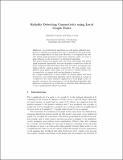Reliably Detecting Connectivity Using Local Graph Traits
Author(s)
Cornejo Collado, Alex; Lynch, Nancy Ann
DownloadLynch_Reliably detecting.pdf (398.2Kb)
OPEN_ACCESS_POLICY
Open Access Policy
Creative Commons Attribution-Noncommercial-Share Alike
Terms of use
Metadata
Show full item recordAbstract
Local distributed algorithms can only gather sufficient information to identify local graph traits, that is, properties that hold within the local neighborhood of each node. However, it is frequently the case that global graph properties (connectivity, diameter, girth, etc) have a large influence on the execution of a distributed algorithm.
This paper studies local graph traits and their relationship with global graph properties. Specifically, we focus on graph k-connectivity. First we prove a negative result that shows there does not exist a local graph trait which perfectly captures graph k-connectivity. We then present three different local graph traits which can be used to reliably predict the k-connectivity of a graph with varying degrees of accuracy.
As a simple application of these results, we present upper and lower bounds for a local distributed algorithm which determines if a graph is k-connected. As a more elaborate application of local graph traits, we describe, and prove the correctness of, a local distributed algorithm that preserves k-connectivity in mobile ad hoc networks while allowing nodes to move independently whenever possible.
Date issued
2010-12Department
Massachusetts Institute of Technology. Computer Science and Artificial Intelligence Laboratory; Massachusetts Institute of Technology. Department of Electrical Engineering and Computer ScienceJournal
Principles of distributed systems (Lecture notes in computer science, v. 6490)
Publisher
Springer
Citation
Cornejo, Alejandro, and Nancy Lynch. “Reliably Detecting Connectivity Using Local Graph Traits.” Principles of Distributed Systems. (Lecture notes in computer science, v. 6490) Springer Berlin / Heidelberg, 2010. 87-102. Copyright © 2010, Springer
Version: Author's final manuscript
ISBN
3642176534
9783642176531